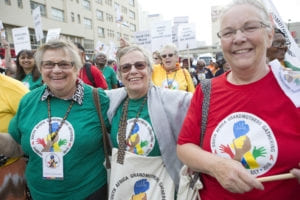In the midst of international terrorist attacks and great global unrest, seeing people continue to work across international borders and battle against forces greater than human conflict is truly inspiring, especially when it comes to the HIV/aids epidemic.
The Grandmothers to Grandmothers Campaign connects Canadian and African grandmothers and gives them a platform in Sub-Saharan Africa to provide support for their grandchildren, whose parents have been decimated by the HIV/aids epidemic. There are over 14 million orphans in Africa after their parents contracted and died of HIV/aids and many grandmothers are raising their grandchildren alone.
The organization was founded in 2006 in Toronto. “The Stephen Lewis Foundation invited 100 grandmothers from sub-Saharan Africa to come to Toronto for a gathering and 100 Canadian grandmothers came as well. The Canadian grandmothers listened to the African grandmothers and what they have had to do to deal with the Aids pandemic,” Grannies for Good founder, a chapter of the Grandmothers to Grandmothers Campaign, Joanne Gormely says. “It really created a connection between 250 groups of grandmothers in Canada in solidarity with grandmothers in Africa.”
The campaign is not a charity run by people who aren’t African, but instead is a movement created and controlled by African grandmothers and local field workers who have first-hand knowledge about what these communities need.
Gormley is one of the Canadian grandmothers who began a chapter in Montreal to support the campaign. She, along with other grandmothers, run events ranging from art sales to long-distance cycling fundraising for the grandmothers in Africa. Gormley has her own painful memories associated with HIV/aids. “I lost my own brother to Aids. I was still in grief of losing my own younger brother when I joined the group,” she says. “It touched me because I understood something they were living through.”

Gormley, along with nine other grandmothers, also traveled to Africa to join a meeting of over 300 grandmothers in Durban, South Africa ahead of the 2016 World Aids Conference that ran from July 18-22. The group participated in protest of the lack of funding available to support the raising of these children, and joined over 2000 other grandmothers to Durban’s convention centre where the conference was being held.
The group of 10 traveled to South Africa and Zambia to see firsthand where their funds are going. The Grandmother to Grandmother campaign has raised $25 million over the last 10 years, with the proceeds going to various projects run by African field workers and grandmothers that live in the community.
The campaign has also provided jobs to women in the various communities that run the Grandmother to Grandmother projects. While on her trip to Africa, Gormley traveled with an African woman named Ida who originally grew up in abject poverty, and her husband had also passed away from HIV/aids. She now works for the foundation and her daughter is studying to become a lawyer.
These inspiring activists lobby governments across sub-Saharan Africa to take further measures to stop the spread of HIV/aids. The region has seen a 43 per cent decline in new HIV infections among children since 2009 due to UNAIDS global plan to eliminate HIV infections in the region. Public decimation of the antiretroviral treatment and educating has helped to lower the rate of HIV/aids. That being said, 24.7 million people are still living with HIV in sub-Sahran Africa due to lack of access to the medicine, with only 39 per cent of adults on the antiretroviral treatment.
Not only is this campaign helping reduce HIV in Africa, but this women-led group is also helping promote solidarity among women across the world. “The campaign promotes a sense of camaraderie and belonging by making a difference and being a voice for Africans in a global world. It helps in overcoming a sense of hopelessness,” Gormley says. “There is anger in those African women and they have a right to be angry. They deserve to be heard.”
The grandmother to grandmother campaign is a great initiative supporting women that are working together to solve issues from different cultures. We should all take these lessons from our elders and join the movement to help promote an agenda to eradicate aids from sub-Saharan Africa once and for all.

